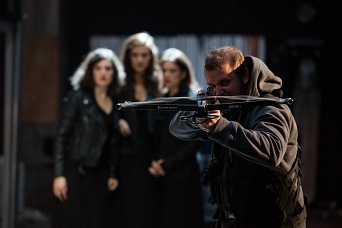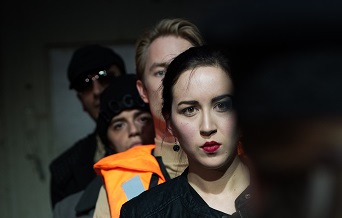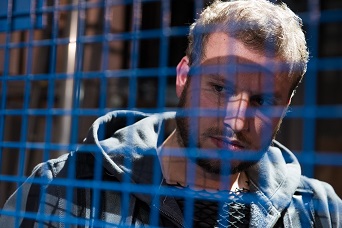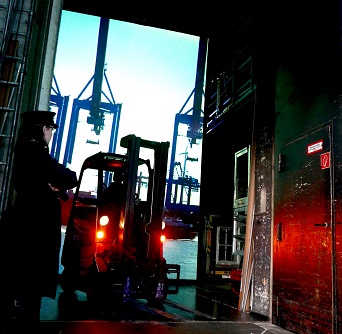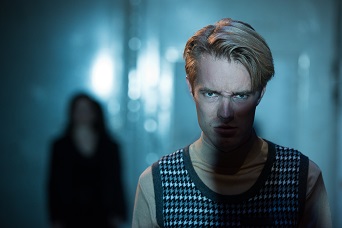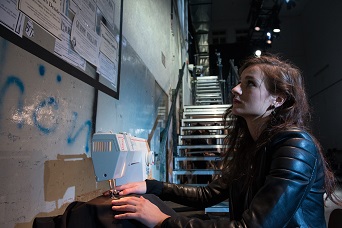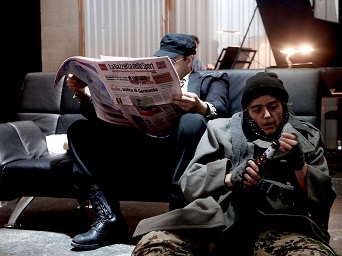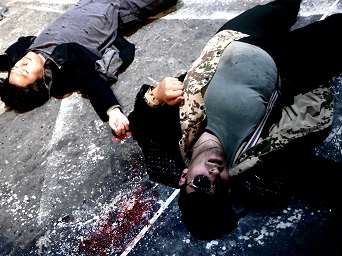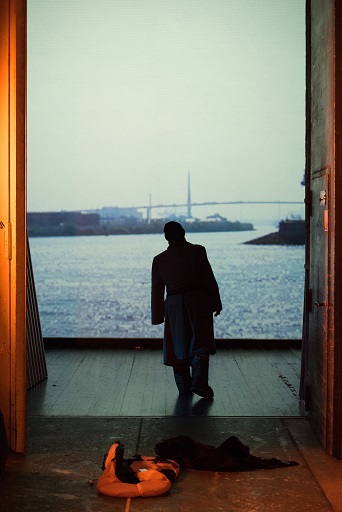2016 October 17th
ULISSE
Music-theatre after Claudio Monteverdi
worldpremiere: October 17th, 8 p.m.
further performances: October 19th/21rst, November 23rd/29th,
Dec 1rst, 2016, Westcamp on the backstage of the Prinzregententheater Munich, Germany
musical direction, version: Joachim Tschiedel
Accademia di Monaco extra:
Franziska Dolling (flutes), Maria Fitzgerald (harpsichord), Dorothea Kügler (dulcimer),
Franz Anton Peter (dulcimer), Birgit Stolzenburg (dulcimer), Joachim Tschiedel (organ), Anna Zimre (gamba)
Production, stage, setting, version: Martina Veh
Bodywork: Toni Gruber
Language Coaching: Dr. Loretta Trinei
Dramaturgy: Anna Raisig
Costumes: Christl Wein-Engel
Light design: Benjamin Schmidt
Video: Raphaela Andrade
photos1-4, 6, 7, 10: Jean-Marc Turmes, photos 5, 8, 9: Christl Wein
Right reserved for the cover photo: Theatre Academy August Everding (Zoeller)
with
Pia Buchert (Penelope), Jaeil Kim (Eurimaco), Jessica-Veronique Miller (Penelope),
Julia Moorman (Melanto), Bavo Orroi (Telemaco), Andromahi Raptis (Iro),
Stefan Sbonnik (Ulisse), Clara Corinna Scheurle (Penelope),
Irakli Atanelishvili (Nettuno) und Andreas Böhm (worker at the harbour)
Evening show direction, video inspiency, assistant director, props: Marie Philine Pippert
Costume Assistance: Annika Österreich
Lighting efficiency: Clara Tolle
Technical production manager: Stefan Wintersberger
Stage managers: Andreas Böhm, Markus Flossmann
Video editing: Raphaela Andrade
Head of sound engineering: Miriam Reinhard
Head of video technology: Thomas Zengerle
Head of the costume department: Elisabeth Funk
Management of the prop: Kristof Egle
Production management: Alexandra Zöllner
Rights on the musical version: Martina Veh and Joachim Tschiedel
Duration: approx. 90 minutes without break
A harbour. Waiting women. Ulisse had gone to war with his men -
a war that was not his. Penelope, his wife, has been waiting for him for 20 years now.
She and her son Telemaco, who never knew his father, are just two of the many abandoned. The story of Ulisse's difficult homecoming begins.
In a comprehensive musical adaptation, the director Martina Veh
and musical director Joachim Tschiedel bring Claudio Monteverdi's opera to the stage in a new guise.
For the first time, this performance will take place in the West Warehouse at the Prinzregententheater, a venue that is not normally accessible to the public.
August Everding Theatre Academy and Munich University of Music and Theatre with the Master's programme Music Theatre/Opera Singing
(with special thanks to Prof. Karl Köwer, Jochen Krug, Balazs Kovalik)
LIFE IN THE INTERMEDIATE STAGE
by Anna Raisich
Penelope has been waiting for her husband for twenty years now. It is a life in between. Her old life is irretrievably lost, and she cannot start a new one without knowing the whereabouts of Ulisse. She keeps the suitors, but she is the only one in this state who cares about business. What use are Malanto's persuasions? Penelope, the unfortunate, the strong, keeps her word. And doesn't dare to be happy. While her son grows up without ever having met his father.
It is also a life of uncertainty, of constant fear for Telemaco's life.
Will the suitors kill him before he makes legitimate claims to power?
For Telemaco, his father is a legendary figure, the hero of countless tales he has heard throughout his life. Overprotected and crushed by his his mother's grief, he takes refuge within himself and wages his own personal war there. No wonder that the longed-for relief fails to materialise when he finally meets the man who is supposed to be his father.
As if to rub her nose in it, Melanto, a confidante of Penelope's, enjoys the pleasures of love. Who cares that Eurimaco is actually after Penelope - or rather: her position - and exploits his mistress to end up with her. In any case, the eternal talk of war, of the past, has to stop. Let those who want to suffer, they are young and want to live - preferably as a new "Royal Couple".
Everyday life in the port's executive suite: Nettuno is in a bad mood. If it's up to him, people have only themselves to blame for their suffering. So there's no reason to be lenient.
Anyone who messes up, especially those who mess with the bosses, should be punished. Bad
cards for immigrants of all kinds who reach the port, because he is the boss here.
Minerva disagrees. She does not lack determination and a healthy dose of opportunism. If only Nettuno hadn't been blocking the boss's chair for twenty years. When she finds Ulisse asleep, her moment has come. She takes care of him and forges a plan with him for the a campaign of revenge against the suitors.
Iro wants to have nothing to do with the power games. Unless there is something in it for him.
Everything else is a waste of time, after all, life offers all kinds of pleasures. Let the others toil away. At Nettuno's side he lives the life of a parasite. But Ulisse's return suddenly changes everything:
Egged on by Nettuno, he takes on Ulisse and is mercilessly defeated.
He manages to escape unharmed from Ulisse's bloody revenge, but what now?
The parasite has lost its host.
Twenty years have passed since Ulisse last set foot on home soil, because he went to a war whose cause was not his own. "Dormo ancora, o son desto?" (Am I still asleep or awake?), he asks himself as he awakens in Ithaca. The sweet sleep has left him, gone is the moment of rest and comfort. The sleep is innocent, but Ulisse is notinnocent at all. And he cannot
forget. When Ulisse returns, nothing is kept as it once was. His wife and child no longer recognise him, adversaries take his place, harass his wife and humiliate him as an intruder. He violently seeks to end the threshold state and restore his old life. Murder is again the last
remaining remedy.
"Consorte io sono, ma del perduto Ulisse" (Wife I am, but that of the lost
Odysseus), Penelope replies to him when they meet again. Is the old Odysseus, the
man she loved twenty years ago, for whom she has waited so long, lost forever?
What was all the suffering for? It is the story of Ulisse's return. There is no ending at the end. But a (new) beginning.
Die Suche nach der Wahrheit
Die Bearbeitung ist aber nicht bloß musikalischer Art. Vor dem Hintergrund der
historischen Gebundenheit von Mythen, ist es im Grunde naheliegend, dass aus der
Beschäftigung mit Monteverdis Version der Odyssee von einem heutigen Standpunkt
aus wiederum eine eigene Lesart hervorgeht. Daher der Zusatz „Musiktheater nach
Monteverdi“. Das Resultat ist – wie der stark gekürzte Werktitel andeutet – eine
dichte und kondensierte Auseinandersetzung mit den Mechanismen der Macht und
ihrer Auswirkung auf den Einzelnen: Welche Mächte lenken heute unser Schicksal?
Wer sind die Götter, deren Sirenengesang uns ins Verderben lockt? Sind wir
verloren? Oder gibt es einen Ausweg? Die Protagonisten in der Erzählung von
Ulisses Rückkehr sind Suchende, Orientierungslose. Stets gilt es, Widerstände zu
überwinden. Die List wird zum unentbehrlichen Werkzeug in einer Welt, in der Trug
und Schein jedwedes Vertrauen unmöglich machen.
Alles nur Denkbare wird hier durchgeschleust. Durch den Hafen. Er ist eine klaffende
Wunde. Endpunkt der endlosen Reisewege der Waren. // Nichts ist klar und
eindeutig. Alles wird erst wahr, sobald es geschieht. In der Dynamik der totalen
Macht gibt es nichts, was über das Konkrete hinausgeht. // Alle, die ich kenne, sind
tot oder im Gefängnis. Ich will ein Boss werden. Und dann will ich sterben. Aber wie
ein echter Mann, einer der wirklich das Sagen hat. Ich will umgebracht werden. // Wir
sind Unternehmer, weiter nichts. // Alle umbringen. Alle miteinander. Auch, wenn
man sich nicht sicher ist. Auch, wenn man nicht weiß, auf welcher Seite sie eigentlich
stehen. Schieß! Es ist Dreck. Dreck, nur Dreck. Im Krieg, wenn eine Niederlage
droht, sind Verbündete und Feinde austauschbare Rollen. Aus Individuen werden sie
zu Elementen, an denen sich die eigene Macht erprobt und beweist. Erst danach
werden die Seiten abgesteckt, die Verbündeten, die Feinde. Zuvor muss man erst
einmal schießen. // Geschäfte zu tätigen ist der einzige Grund, weshalb man
morgens aufsteht, die Motivation, die einen aus dem Bett holt und auf die Beine
stellt. // Alles was ich habe in dieser Welt, ist mein Mut und mein Wort. Und das
breche ich nicht. Für niemanden. Ist das klar? // Du fühlst einen inneren Druck wie
nach zu üppigem Essen oder zu viel miserablem Wein. Eine Angst, die nicht auf
Plakaten und in den Zeitungen herausgeschrien wird. Es marschieren keine Truppen
ein, und keine Flugzeuggeschwader verdunkeln den Himmel, den Krieg fühlst du in
dir. // Man denkt, die letzten Worte eines Sterbenden seien sein letzter, wichtigster,
grundlegender Gedanke, als spräche er beim Sterben aus, wofür es sich zu leben
gelohnt hat. Das stimmt nicht. Beim Sterben kommt nichts als Angst zum Vorschein.
Alle oder fast alle wiederholen denselben banalen, einfachen und
selbstverständlichen Satz: „Ich will nicht sterben.“ // Mach weiter. Tu, was du tun
musst, alles andere zählt nicht.

